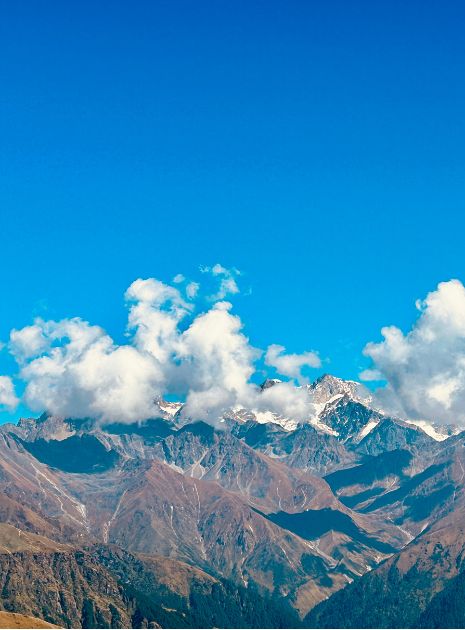Ranikhet
Ranikhet doesn’t rush you. It lets you take your time. A soft hill town wrapped in pine trees, sitting quietly in the Kumaon hills, where the mornings are slower and the air feels washed and new.
Ranikhet doesn’t rush you. It lets you take your time. A soft hill town wrapped in pine trees, sitting quietly in the Kumaon hills, where the mornings are slower and the air feels washed and new.
They say a queen once passed through this vicinity and decided to stay. Whether it’s just a story or something real, it doesn’t leave an awful lot. Walk right here even once, and you’ll recognize why she did.
Ranikhet isn't only a metropolis. It’s a sense that stays with you longer than you count on.
You breathe in another way in Ranikhet. The air smells like pine needles, cool stone, and now and then, a little bit of old wool. It moves slowly and progressively, like the whole lot else right here. A distant bell from a temple. The quiet thud of a broom on stone. This isn’t a place where life is on display. It’s where life continues softly and without noise.
When the sun rises, it does so gently. You won’t find golden drama in the sky. You’ll see light creeping up over the trees. You’ll hear someone washing metal plates at the tap. You’ll watch a cow turn lazily down the slope.
Maybe you’ll be sipping tea in a kulhad (कुल्हड़) on a bench outside your guesthouse. Maybe you’ll be walking nowhere in particular. That’s how mornings work here. You don’t plan them. You feel them.
There are hundreds of bells hanging here. Some old, some shiny, some nearly falling apart. Each one was tied by someone who asked for something and left behind a thank you.
There’s no queue. No loud chants. Just the quiet rhythm of faith. An old woman is tying a thread. A boy is placing flowers near the idol. The sound of bells moves with the wind, not with people. You don’t need to ask for anything. You just sit. The place speaks first.
Chaubatia Orchards and the Trees That Feed the Valley
A little further up, Chaubatia opens up like a breath. Rows of apple trees. Plum, apricot, peach all growing in quiet rows on slopes that face the sky.
There are no fences. Just soft soil under your feet and a local guide who may hand you a fruit, still cool from the night air, and say Taste it, it’s better today.
You don’t visit to pick fruit. You visit to feel the stillness between the trees.
The market doesn’t chase you. It just waits. Wool shawls were folded neatly. Hand-knit sweaters are stacked carefully. Wooden toys. Copper thalis (थाली). Homemade namak para (नमक पारा) in old glass jars.
The shopkeepers won’t call out. A nod is enough. Maybe they’ll offer you chai (चाय). Maybe they’ll tell you who stitched that sweater, how long it took.
You don’t go to the shop. You go to listen.
As the sun lowers, the hills take a deeper shade of blue. You feel the air shift. Your hands reach for a shawl. A woman lights an angithi (अंगीठी). Someone plays a harmonium behind a half-closed window.
Children call each other home. A dog stretches before curling near the temple steps. You walk slower without noticing. You start whispering without realising.
Evening doesn’t fall in Ranikhet. It settles.
Winter here isn’t a storm. It’s a hush. Soft snow on rooftops. School kids wrapped in wool too big for them. The smell of burning wood and ajwain (अजवाइन) roti on a tawa.
Spring comes gently. Flowers bloom in the corners of old gardens. Trees shake off the last bit of cold. Everything stretches quietly.
Monsoon brings mist. Real mist. The kind that folds around your shoulders. Roads disappear and return while you’re standing still.
Autumn arrives with golden light. Crisp air. Fewer words. Just more space to think.
You could visit the golf course. You could walk to the church. You could stop by the army museum. But you could also sit by the same tea shop every morning and watch the same boy run past with his school bag swinging sideways.
You could walk the same road twice just to hear how different it sounds when the wind moves. Ranikhet doesn’t demand that you do anything. It allows you to be.
You may not take many photos here. Nothing is calling for a pose. But you’ll remember the way the wind moved through the pine trees. The soft thump of a sweater being folded in a shop. The stillness of sitting alone and not needing to speak.
In Ranikhet, peace isn’t a place. It’s the way everything happens without trying too hard. You leave. But not really.
| All Sub Districts | ||
|---|---|---|
| Syaldey | Salt | Jalali |
| Lamgara | Machhor | Bagwali Pokhar |
| Barechhina | Bhikiyasain | Chaukhutia |
| Dhyari | Dwarahat | Bhanoli |

Uttarakhand is not simply another country. People here name it Devbhoomi (देवभूमि), the Land of the Gods. And it feels that way. Rivers begin right he......
See Details